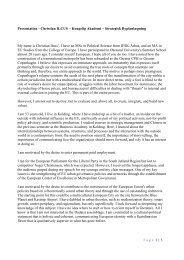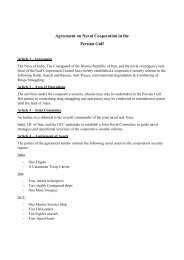china IR rev final sept 2023
This is the fourth and penultimate edition of my annotated bibliography on China international relations, art and Philosophy. from the books I distill policy relevant ideas for use and comsideration of policymakers after the ratification of the Cai, when the relatioship willl have to be managed
This is the fourth and penultimate edition of my annotated bibliography on China international relations, art and Philosophy. from the books I distill policy relevant ideas for use and comsideration of policymakers after the ratification of the Cai, when the relatioship willl have to be managed
You also want an ePaper? Increase the reach of your titles
YUMPU automatically turns print PDFs into web optimized ePapers that Google loves.
Shyam Saran How China Sees India and the World. The authoritative<br />
Account of the India-China relationship, Juggernaut Publication, 2022.<br />
So how does China perceive India? According to the author Chinese perceive themselves as the most consequential and<br />
most important of ancient civilizations. Saran uses contemporary Chinese scholarship, CCP leadership speeches and<br />
writings, and his experiences as a diplomat and foreign secretary. Based on understanding, what drives their worldview,<br />
an assessment can be made of China’s likely future behavior. This book complements Vijay Gokale’s The Long Game:<br />
How the Chinese Negotiate with India.<br />
Thomas J. Biersteker, Robert Carlin & Chung-In Moon Understanding Kim<br />
Jong-Un’s North Korea. Regime Dynamics, Negotiation and Engagement,<br />
Lexington Books, 2022.<br />
This book is organized around an assessment of how Kim Jong-Un’s regime calculates, balances, and addresses the<br />
various key policy challenges it faces based on the three author’s wide-ranging experience with North Korea. This gives<br />
the authors a hands-on experience with how North Korea works. Contrary to the perceptions, myths, and single-issue<br />
studies – such as dynastic survival or economy-based analyses, this study provides an integrated approach and<br />
constitutes an essential contribution to our understanding of North Korea. Required reading for those who want to reengineer<br />
the six-party talks toward peace on the Korean peninsula are Mi-Yeon Hur’s The Six-Party Talks on North<br />
Korea: Dynamic Interactions among the Principal States or on the same issue by the prolific Leszek Buszynski ‘s<br />
Negotiating with North Korea: The Six-Party Talks and the nuclear Issue. Indeed, the strategy of incurring costs on<br />
Pyongyang is a harbinger of conflict and seems to have created another unproductive and unstable stalemate. Jagannath<br />
P. Panda addresses the power play among major Asian powers around Korea and its impact on the Indo-Pacific region<br />
from an Indian perspective in The Korean Peninsula and Indo-Pacific Power Politics. Bo Gao examines sub-state and<br />
non-state actors’ influence on Chinese-DPRK relations in China’s Economic engagement in North Korea. Wonjae<br />
Hwang’s South Korea’s Changing Foreign Policy: The Impact of Democratization and Globalization provides a<br />
perspective on Korea's foreign policy. Marco Milani, Fiori, and Dian’s The Korean Paradox: Domestic Political Divide<br />
and Foreign Policy in South Korea approach the subject by studying beliefs, traditions, and identities. Finally, Jongwoo<br />
Han, in The Metamorphosis of US-Korea Relations, traces the evolution of US-Korea relations from US aspirations of<br />
linking-up Alaska, the Philippines, The Samoan Islands, and Korea to complete a defense perimeter in the Pacific and<br />
its dominance in the Asian market. This led to a decline of the Chinese sphere of influence and reduced size of Russian<br />
power in the Pacific, and to the rise of Japan, which brought about all sorts of ills to the Korean peninsula, such as<br />
Japanese colonization, the division of Korean along the McArthur-line following the occupation of Japan and<br />
subsequently the Korean War due China’s backing and Stalin’s eagerness for war and for <strong>rev</strong>anche stimulated by the<br />
North Korean regime’s desire for challenging the post-WWII-status quo. According to Wasif Khan (2022:60),<br />
considerations of Mao were three-fold: First, Beijing’s need for a buffer zone ideally ideologically sympathetic to its<br />
North East. Second, the non-recognition of the US of the PRC. Third, an interest in providing sufficient Chinese<br />
capabilities, upending American troops in South Korea, withdrawing all US troops from Taiwan, and the PRC’s<br />
resumption of China Taipei’s seat in the UNSC. Thus, the Korean War broke out, which ended along the 38 th parallel,<br />
drawn up by General MacArthur. Han believes the US-Korea relationship has come around full circle and that it is time<br />
for the US to recognize North Korea in the interest of a settlement of the Korean question. Given that Korea has been<br />
used as a staging ground for both Chinese incursions into Japan and, more recently, Japanese colonization of Korea and<br />
incursions into China, and Western projected interest in p<strong>rev</strong>enting a Japanese-Chinese condominium, compared with<br />
Japan’s historical tendency to tilt towards the stronger party in Asia, care needs to be taken about the form. Content<br />
Korean unification may take and impact the balance of power in North East Asia. Renewing the peace and cooperation<br />
treaty between Japan and China is not anathema to Western interests. But how would China and Japan react to a unified<br />
and strong Korea?<br />
Brian Gewirtz Never Turns Back—China and the forbidden history of the<br />
1980s, Belknap Press, 2022.<br />
This is a rather interesting book on the discussion taking place not only on the streets and a fringe group of dissident<br />
public intellectuals but inside the corridors of power on the possibility of China transitioning to democracy in 1980’ies<br />
based on Chinese archives, official accounts, diaries, and memoirs, some which have only recently become available.<br />
Page 18 | 29








